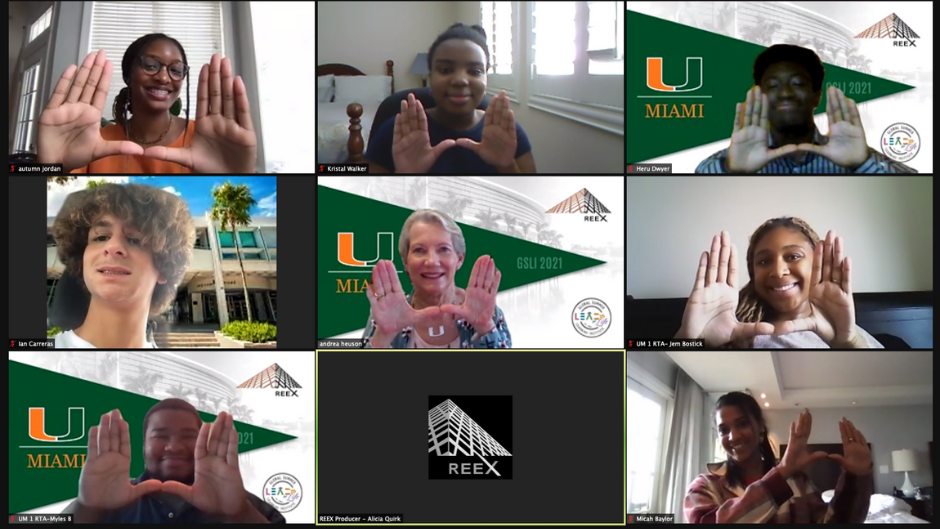For the third consecutive year, Miami Herbert participated in the Real Estate Exchange (REEX) Summer Program as a top institution for commercial real estate during an intensive, two-week curriculum aimed at preparing future leaders in the field. Launched in 2018 by board members of the Real Estate Executive Council (REEC), REEX brings together select African American, Latin, and other minority students from high schools across the country to receive a solid, initial understanding of commercial real estate. The program encourages a growth of minority representation within the industry and reflects Miami Herbert’s continued initiative to extend opportunities among diverse populations.
The virtual, immersive experience, which ran from June 21 to July 2, alternated between a master class format, bringing the nearly 90 students together for lectures on fundamentals and guest speaker sessions, and a cohort format consisting of groups of about 22 students per participating institution, which also included Cornell, New York University, and the Massachusetts Institute of Technology.
“It was a really fulfilling experience to have the opportunity to listen to so many accomplished people and to hear their stories,” says student Fathima Shaikh about the guest speaker sessions. “We learned a lot from them. I didn’t know anything about real estate, and now I feel that I have a lot more knowledge because of this program.”
In the cohort setting, hands-on projects included UrbanPlan, a portion of the curriculum developed by the Urban Land Institute, and a separate, final capstone project. UrbanPlan allowed students to explore circumstances and possible solutions for a frequently occurring scenario in the United States: a once thriving community now faces decaying conditions. Students took on roles as city liaisons, financial analysts, marketing directors, neighborhood liaisons, and site planners to propose a revitalizing plan for the fictional town.
For the capstone project, teams of four or five within each cohort prepared a site development proposal to reinvigorate challenged areas in their communities. Each team competed against each other, with the top team from each university group moving on to present their plans at the capstone finals on the last day of class.
Miami Herbert’s Academic Director of Real Estate Programs and Finance Professor Andrea Heuson led the University of Miami cohort in creating redevelopment propositions for the Shoppes of Liberty City commercial plaza. Members of the cohort’s winning team, rising juniors and seniors Kristal Walker, Micah Baylor, Heru Dwyer, Autumn Jordan, and Ian Carreras, envisioned “Project Life & Liberty,” a redevelopment plan that would transform the site into a dynamic residential, retail, and light industrial complex.
During the final competition, REEX Board Vice Chair James Simmons, serving as one of the judges, explained the evaluation process. “We assessed the quality of work given the short, two-week time span and the high level of collaboration that had to occur in a remote fashion,” he stated.
After deliberation with fellow judges, which included REEX Board Chair Tammy Jones, Principal at Endura Advisory Group Albert McNeel, and Senior Vice President for NAIOP (the Commercial Real Estate Development Association) Marc Selvitelli, Simmons declared the UM and NYU teams as the dual first place finishers.
Sharing top accolades, the NYU team had proposed rejuvenating Lot 57 in central Harlem by turning the currently vacant structure into a 20-floor building incorporating residential units and nonprofit and health facilities. Each member of the first-place teams received $500 in cash prize.
“I really enjoyed it,” Walker, who attended from Las Vegas, says about the overall experience. “It opened up different avenues for me and I am now considering becoming a developer and doing redevelopment projects in different areas.”
Some students already had familiarity with the subject matter. As the daughter of a commercial real estate professional, Maya McBride from Long Island, a member of the UM cohort and currently a student under the University of Miami Summer Scholars program, felt that she had a basic understanding, but was surprised by the depth of knowledge that she attained. “It was great connecting everything that we were learning and doing, especially in the UrbanPlan and capstone projects, with topics that I have grown up seeing and hearing my mom do or talk about,” she says.
As part of the program’s networking emphasis, students initiated long-term networking capabilities by creating their LinkedIn accounts and having access to REEX advisors and university mentors, in addition to the opportunity to connect with guest speakers throughout the course.
“We are helping to create a complete ecosystem that will hopefully help guide you into the future,” Simmons told the class during the last day’s closing remarks. Regarding the potential that students had demonstrated, he added: “We hope that every one of you becomes a real estate practitioner because if you so desire, you have bright futures ahead of you.”
REEX students may move forward with the foundation and tools that they need through the years ahead to help steer their direction as they continue to explore career opportunities in commercial real estate.

